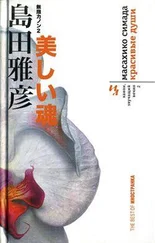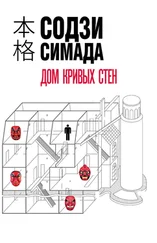“Just walking in out of the next world to say, ‘Here I am,’ huh? I had a look in the cupboard in there just now and found that collection of our old clothes, Dad’s and mine. I even came across those old reference books you bought me when I was a kid.”
“Well I can’t get things organised properly. There’s mountains of stuff I’d like to throw away, but if I just did it without asking, you and Daddy would complain.”
“Dad couldn’t complain if he wanted to. OK, if you want to keep things Mum, go right ahead. This house is too big for you on your own, after all. Having some junk around won’t bother you, I imagine.”
“What are you saying!” exclaimed his mother, astonished. “Your father’s due back at any moment.”
“You’re living with a ghost, I see. Good thing ghosts don’t take up any room.”
His mother made no attempt to smile at the joke. She simply looked as if she couldn’t follow his thread. She didn’t even seem to recognize that it was a joke. Could it be that she wasn’t putting it on, that she really was going senile?
“Dad died four years ago, right?” The only thing for it at this stage, if she really did have the illusion that he was still alive, was to come straight out with it.
“Yes, I guess he did, didn’t he? Four years ago already?” His mother turned her empty gaze to left and right, like a puzzled child groping for the answer to a math problem.
“Hey come on, pull yourself together.”
“But it’s very strange. He came home as usual last night. And when he went out this morning he said he’d be able to come home by three today.”
“Where did he go?”
“He said he had something to do in Shibuya.”
Shibuya was precisely where Kita was headed next himself. Did she dream it? Or was she still playing out the dream now in her sitting room? Or had the clock inside her head broken, so that the past tense had changed into the present continuous? No wonder she couldn’t figure out what was going on, if her son of around twenty suddenly turns up looking thirty-five.
Had living alone done this to her? Was she watching television? Was she communicating with the neighbours? He’d telephoned from time to time, but their only conversation had been of the “How are you?” “Same as usual, thanks” variety. And now this “same as usual” life had somehow become one in which the son had come to announce his self-appointed execution, while the mother had grown senile.
“You haven’t been in hospital with some problem like a stroke or a brain tumour or something, have you?”
“Yes.”
“When?”
“I forget.”
“Why didn’t you tell me?”
“I didn’t want to worry you.”
“You can’t live on your own if you go senile, you know.”
“If I go senile, you and Daddy will come back and look after me. We’ll be able to live here all together just like the old days, won’t we?”
“Why are you like this? Go and get some treatment, for heaven’s sake. You’ve got to get a grip on reality again. Dad’s dead, OK? And I can’t come back home. So I’m begging you… please.”
“Please what?”
“Please don’t go senile, I’m saying.”
Here he was begging his senile mother not to go senile, he thought. He felt like going down on his knees and praying, although he knew prayer wouldn’t get his mother’s brain back to the active brain it had been fifteen years ago.
“Is it wrong to go senile?”
“Yes, it is.”
“I just stay here in the house, you know, I don’t bother anyone. What’s wrong with it?”
“It’s because you stay in the house all the time that you’re going senile.”
“I go out shopping. If you’re worried about me, come back and live here. There you are just messing about, not getting married. I’ll bet you don’t think about anything much.”
“I’ll look after you in your old age, Mum.”
“I don’t need you to. I’ll freeze being looked after by such a cold fish of a son. No, I’m the one who’ll look after you. You can’t do anything on your own, Yoshio. Just when I think you’re improving yourself with some zazen , you go and give it up—”
“Stop talking about stuff that happened twenty years ago. The problem is how you’re going to cope with the present.” A fine thing for an intended suicide to say, he heard a little voice saying inside him. Still, he went on berating her.
“When you get up in the morning, check your face in the mirror. Put on a bit of make-up. And go out for walks. Take a good look at the world getting on with things all around. Talk to children whenever you get the chance. Children grow up fast, you know. And keep a constant check on where you are right now and what you’re doing. You can do that, can’t you?”
Tears began to flow from his mother’s misty eyes. She didn’t attempt to wipe them away. She sighed, with an expressionless face that registered no particular sadness or pleasure. Maybe her tear ducts just leaked a bit these days.
“What can it be, I wonder? My face looks weird when I look in the mirror, and this area’s all changed too – there are all sorts of faces around that I don’t know. It’s like I’m left behind all alone somehow. Though there’s nowhere else to go, mind you.”
If his Dad was still alive they could go off on a trip together, have a few quarrels, make up again, drink sake, make love. Maybe while they were in Atami someplace eating dried fish or noodles his father would suddenly declare, “It’s splendid weather, darling. Why don’t we commit suicide?” If his Dad showed up right now and made such a suggestion, his Mum would probably go off with him with pleasure.
“Right, I’d better be off.”
“Where to, dear? You’re not staying here the night?”
“There’s somewhere I have to go.”
“You don’t have to go there today, surely?”
“No, I can’t put it off.”
“You won’t be back for months again, I guess. My mind may well be in a worse way by then, you know.”
Was she trying emotional blackmail on him? Or was this perhaps her only means of resistance? Probably his presence would be her best form of rehabilitation. If there was someone else around to keep making clear to her that her husband was dead, she’d get the message and scramble back out of the past in panic. It didn’t seem like she was having problems with the housework, so things weren’t too bad yet, after all.
Maybe, on the other hand, it was better for her senility to grow worse. At least that way she’d have a happy old age. If you’re senile, your pleasures halve, but so do your sorrows. If the pleasures and sorrows to come in her life were weighed in the balance, the sorrows were probably greater. This son of hers who’d do her so much good if he stayed around was going to be dying this week, sure, but in his mother’s hazy mind he probably wouldn’t be dead. Her son would simply turn into a ghostly young man of around twenty who came and went in the house. He and his Dad together could settle back in to become a family for her again. That was a better outcome. If she underwent some kind of half-baked rehabilitation and got her mind back together again, the next thing that loomed in her life was double the sorrow over losing her son, after all. The only way to escape from this was senility.
“I’ll be back. Soon. Say hi to Dad for me.”
Kita hoisted on his survival backpack and slipped his feet back into the new zebra shoes. Next time he came, he’d be without form or shape, no more than a hint in the air. Nevertheless, thanks to her fine intuition, his mother would no doubt sense her son’s presence, and cook him up his favourite croquettes. Though all you would see would be plates of croquettes and chopsticks on the table, Yoshio and his Dad would be there in a corner of her brain, remembering things with an occasional laugh together, smoking, clipping their nails, flipping through the newspaper, and easing out an occasional silent fart.
Читать дальше












